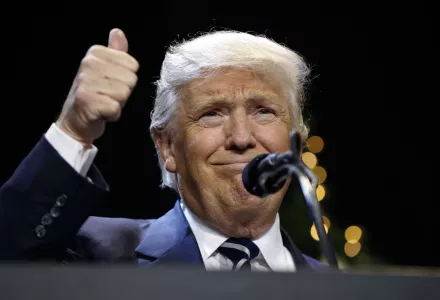
Note
A Hebrew-language version of the op-ed appeared in Haaretz on January 15, 2017. The translation was provided by the author.
On the eve of his entry into the White House, instead of cloaking himself in a mantle of presidential respectability and of comporting himself in a manner that indicates his appreciation of the grave responsibility he will soon bear, Donald Trump prefers to appear as someone who is determined to break things and overturn long established ways of the world. Only one thing is clear: Trump will be a one-issue president — his own personal benefit — and that this consideration will guide his entire presidency. This predilection has already been manifested in a series of statements and actions, often in tweets, that are indicative of the impending changes in U.S. policy. Policy changes are legitimate, that is what he was elected for, but the overall impression is that Trump is motivated by fleeting political and personal gain, rather than deep strategic thought.
Ever since his election the Israeli right has been celebrating the end of the era of the two-state solution and American opposition to the settlements. In this new utopia, complete strategic harmony will reign between the United States and Israel, and Israel will be able to do as it pleases. The issues of relevance to us do, indeed, provide Trump with the opportunity to differentiate himself from his predecessors. Moreover, both his, and his appointees', greater appreciation of the role of power in international politics, which was so lacking in Obama's approach to the world, is important in a region in which relations are still based on power and provides a better starting point for strategic dialogue.
The euphoria, however, may be premature. Obama admittedly erred at times in his approach towards Israel, but he had had a fundamental commitment to it which, for example, led to the provision of the new ten-year assistance package. With Trump, things may be different. He won't tolerate opposition to his policies, certainly not in public, and sooner or later differences will arise, when he concludes that some Israeli policy, whether the settlements or a different issue, makes matters difficult for him. At that point, the honeymoon may come to a rapid end and a premier who stands in his way may receive a resounding slap in the face, devoid of any sentiment.
Trump's understanding that the settlements are not the only obstacle to peace, not even the primary one, is a good basis for coordinating policy on the Palestinians and possibly for new opportunities for progress. Thus, by way of example, Israel should try to reach an understanding with him regarding the status of the settlement blocs and Jerusalem, and in so doing transfer the ball to the Palestinians' court. Trump, however, has already stated that he wishes to reach a final settlement ("the ultimate deal") and braggadocio aside, he is unlikely to wish to go down in history as the president who put an end to the two- state solution. It is unlikely that the two-state solution can survive another eight years of settlement and inactivity and instead of being the settlements’ savior, Trump may in the end be the one to apply unprecedented pressure on us.
Trump and his appointees' tough position on Iran creates an opportunity to reach deep strategic understanding with an administration that may be in office for eight of the Iran deal's nine remaining years. The new defense secretary, however, views the agreement as a done deal, and Trump is likely to reach a similar conclusion. It is to be hoped that Benjamin Netanyahu will resist the temptation to try to reopen the deal, which may lead to an Iranian attempt to cross the nuclear threshold and to a collapse of the international consensus on Iran, and that he will focus instead on that which is both truly important and achievable: improved understandings regarding the means of ensuring that Iran observes the agreement, the measures to be adopted in the event that it does not, and the ways of ensuring that Iran can never go nuclear, following the agreement's expiration, including the possibility of a follow-on agreement.
The Syrian-Iraqi-Iranian (Hezbollah) nexus also presents an opportunity to reach new understandings, along with the possibility of significant differences. The defense secretary and national security adviser–designates view Iran as the primary threat in the region, but Trump's and the new secretary of state's views are still unknown. Israel's view, that resolution of the conflicts in these countries should be contingent on an end, or at least significant reduction, in Iran's role in them, will surely receive a more sympathetic hearing. It may, however, also encounter differences stemming from the United States' broader, global interests and the "grand deal" Trump apparently seeks with Russia, may ultimately lead to disappointing results from Israel's perspective.
On the bilateral level, it is worth remembering that we have already had one president who threatened to take away Israel's nuclear capabilities (Carter), another who imposed sanctions on Israel three times (Reagan) and a third who made financial guarantees contingent on a change in Israeli policy towards the Palestinians (Bush senior). The latter two, by the way, were Republicans.
Israel's dependence on the United States is so deep today that there is a question whether it could even survive without it. The answer is not clear cut. Desperate times lead to desperate measures. However, the very fact that the question can even be raised should lead to some clear conclusions regarding the way Israel conducts its relations with the United States. It behooves a nation which is the beneficiary of an almost unimaginable $125 billion in U.S. assistance, and which will receive almost $40 billion more over the next decade, to demonstrate maximal caution.
The euphoria over Trump's arrival may be premature. The messiah has still not come, nor has he called. At best, he tweets.
Statements and views expressed in this commentary are solely those of the author and do not imply endorsement by Harvard University, the Harvard Kennedy School, or the Belfer Center for Science and International Affairs.
Freilich, Chuck. "The Messiah Hasn't Come. He Only Tweets." Belfer Center for Science and International Affairs, Harvard Kennedy School, January 18, 2017.





